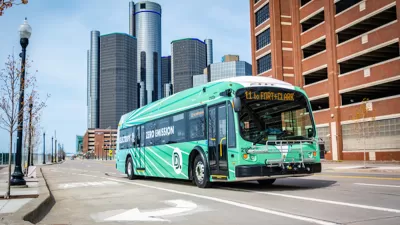A redevelopment plan for Huntington Place would add hundreds of new hotel rooms and create riverfront connectivity.

Detroit’s Huntington Place Convention Center could soon be getting a major makeover that would include hundreds of new hotel rooms aimed at drawing more conventions to the city, reports David Eggert in Crain’s Detroit Business.
“The overall effort could make the area — a complex cobweb of infrastructure that is uninviting to pedestrians — more conducive to a big hotel development that would attract more convention business to the city.” The convention center is managed by the Detroit Regional Convention Facility Authority. As Eggerts explains, “The state's Convention Facility Development Fund, which is funded by hotel and liquor taxes and takes in roughly $100 million yearly, is primarily distributed to counties and the authority.”
The redevelopment would be enabled by a set of bills passed by the state legislature and awaiting Governor Gretchen Whitmer’s signature. “The legislation would let the authority enter into public-private arrangements, lift a $279 million spending cap, authorize $299 million in new bonding and expand the facility's definition to include bike paths, plazas, green space and roads necessary or convenient for use in connection with the facility.”
The authority also wants to connect Second Avenue to the adjacent riverwalk west of the convention center to provide more connectivity.
FULL STORY: Huntington Place could get a pedestrian-friendly makeover — including riverfront access

Study: Maui’s Plan to Convert Vacation Rentals to Long-Term Housing Could Cause Nearly $1 Billion Economic Loss
The plan would reduce visitor accommodation by 25,% resulting in 1,900 jobs lost.

Americans May Be Stuck — But Why?
Americans are moving a lot less than they once did, and that is a problem. While Yoni Applebaum, in his highly-publicized article Stuck, gets the reasons badly wrong, it's still important to ask: why are we moving so much less than before?

Placekeeping: Setting a New Precedent for City Planners
How a preservation-based approach to redevelopment and urban design can prevent displacement and honor legacy communities.

FEMA Resilience Program Cuts Grant Funding
The Building Resilient Infrastructure and Communities program funded projects from flood prevention to power station upgrades.

What the ‘Walk Score’ Misses
A popular walkability assessment omits key factors that impact different demographics and can direct development resources to already wealthy neighborhoods.

How the ‘Direct Vision’ Design Approach Saves Lives
Designing large trucks to ensure better visibility for drivers can reduce fatal crashes and improve workplace safety.
Urban Design for Planners 1: Software Tools
This six-course series explores essential urban design concepts using open source software and equips planners with the tools they need to participate fully in the urban design process.
Planning for Universal Design
Learn the tools for implementing Universal Design in planning regulations.
Caltrans
Heyer Gruel & Associates PA
Institute for Housing and Urban Development Studies (IHS)
City of Grandview
Harvard GSD Executive Education
Salt Lake City
NYU Wagner Graduate School of Public Service
City of Cambridge, Maryland




























